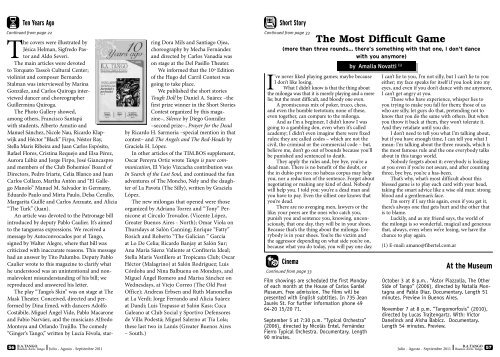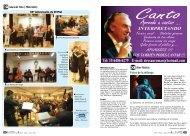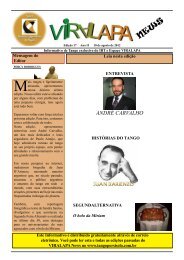Galería de Fotos / Photo Gallery Galería de Fotos ... - Tango por si solo
Galería de Fotos / Photo Gallery Galería de Fotos ... - Tango por si solo
Galería de Fotos / Photo Gallery Galería de Fotos ... - Tango por si solo
You also want an ePaper? Increase the reach of your titles
YUMPU automatically turns print PDFs into web optimized ePapers that Google loves.
Ten Years Ago<br />
Continued from page 22<br />
The covers were illustrated by<br />
Jé<strong>si</strong>ca Helman, Sigfredo Pastor<br />
and Aldo Severi.<br />
The main articles were <strong>de</strong>voted<br />
to Torquato Tasso’s Cultural Center;<br />
violinist and composer Bernardo<br />
Stalman was interviewed by Marina<br />
González, and Carlos Quiroga interviewed<br />
dancer and choreographer<br />
Guillermina Quiroga.<br />
The <strong>Photo</strong> <strong>Gallery</strong> showed,<br />
among others, Francisco Santapá<br />
with stu<strong>de</strong>nts, Alberto Amutio and<br />
Manuel Sánchez, Nicole Nau, Ricardo Klapwijk<br />
and Héctor “Black” Firpo, Néstor Ray,<br />
Stella Maris Ribeira and Juan Carlos Espó<strong>si</strong>to,<br />
Rafael Flores, Cristina Requejo and Elsa Pérez,<br />
Aurora Lúbiz and Jorge Firpo, José Giancaspro<br />
and members of the Club Bohemios’ Board of<br />
Directors, Pedro Iriarte, Celia Blanco and Juan<br />
Carlos Collazo, Martha Antón and “El Gallego<br />
Manolo” Manuel M. Salvador in Germany,<br />
Eduardo Paulo and Mirta Paulo, Delsa Cerallo,<br />
Margarita Guillé and Carlos Anzuate, and Alicia<br />
“The Turk” (Juan).<br />
An article was <strong>de</strong>voted to the Patronage bill<br />
introduced by <strong>de</strong>puty Pablo Caulier. It’s aimed<br />
to the tangueras expres<strong>si</strong>ons. We received a<br />
message by Autoconvocados <strong>por</strong> el <strong>Tango</strong>,<br />
<strong>si</strong>gned by Walter Alegre, where that bill was<br />
criticized with inaccurate reasons. This message<br />
had an answer by Tito Palumbo. Deputy Pablo<br />
Caulier wrote to this magazine to clarify what<br />
he un<strong>de</strong>rstood was an unintentional and nonmalevolent<br />
misun<strong>de</strong>rstanding of his bill; we<br />
reproduced and answered his letter.<br />
The play “<strong>Tango</strong>’s Skin” was on stage at The<br />
Mask Theater. Conceived, directed and performed<br />
by Dina Emed, with dancers Adolfo<br />
Costábile, Miguel Ángel Vi<strong>de</strong>, Pablo Macarone<br />
and Fabio Narváez, and the mu<strong>si</strong>cians Alfredo<br />
Montoya and Orlando Trujillo. The comedy<br />
“Ginger’s <strong>Tango</strong>,” written by Lucía Févola, star-<br />
56 B.A.TANGO<br />
Buenos Aires <strong>Tango</strong> Julio - Agosto - Septiembre 2011<br />
ring Dora Mils and Santiago Ojea,<br />
choreography by Mecha Fernán<strong>de</strong>z<br />
and directed by Carlos Vanadía was<br />
on stage at the Del Pa<strong>si</strong>llo Theater.<br />
We informed that the 10º Edition<br />
of the Hugo <strong>de</strong>l Carril Contest was<br />
going to take place.<br />
We published the short stories<br />
Tough Doll by Daniel A. Suárez –the<br />
first prize winner in the Short Stories<br />
Contest organized by this magazine–,<br />
Silence by Diego González<br />
–second prize–, Prayer for the Dead<br />
by Ricardo H. Sarmoria –special mention in that<br />
contest– and The Angels and The Red-Heads by<br />
Graciela H. López.<br />
In other articles of the TIM.BOS supplement,<br />
Oscar Pereyra Ortiz wrote <strong>Tango</strong> is pure communication,<br />
El Viejo Vizcacha contribution was<br />
In Search of the Lost Soul, and continued the fun<br />
adventures of The Moncho, Nely and the daughter<br />
of La Pavota (The Silly), written by Graciela<br />
López.<br />
The new milongas that opened were those<br />
organized by Adriana Torrez and “Tony” Pernicone<br />
at Círculo Trovador, (Vicente López,<br />
Greater Buenos Aires - North); Omar Viola on<br />
Thursdays at Salón Canning; Enrique “Fatty”<br />
Ro<strong>si</strong>ch and Roberto “The Galician ” García<br />
at Lo De Celia; Ricardo Banjay at Salón Sur;<br />
Ana María Sáenz Valiente at Confitería I<strong>de</strong>al;<br />
Stella Maris Vestillero at Tropicana Club; Oscar<br />
Héctor (Malagrino) at Salón Rodríguez; Luis<br />
Córdoba and Nina Balbuena on Mondays, and<br />
Miguel Ángel Romero and Marisa Sánchez on<br />
Wednesdays, at Viejo Correo (The Old Post<br />
Office); Andreas Erbsen and Ruth Manonellas<br />
at La Verdi; Jorge Ferrando and Alicia Suárez<br />
at Dandi; Luis Trapasso at Salón Kass; Cuca<br />
Galeano at Club Social y S<strong>por</strong>tivo Defensores<br />
<strong>de</strong> Villa Po<strong>de</strong>stá; Miguel Salerno at Tía Lola;<br />
these last two in Lanús (Greater Buenos Aires<br />
– South.)<br />
Short Story<br />
Continued from page 33<br />
The Most Difficult Game<br />
(more than three rounds… there’s something with that one, I don’t dance<br />
with you anymore)<br />
by Amalia Novatti (1)<br />
I’ve never liked playing games; maybe because<br />
I don’t like lo<strong>si</strong>ng.<br />
What I didn’t know is that the thing about<br />
the milonga was that it is merely playing and a mere<br />
lie; but the most difficult, and bloody one even.<br />
A promiscuous mix of poker, truco, chess,<br />
and even the humble teetotum; none of these,<br />
even together, can compare to the milonga.<br />
And as I’m a beginner, I didn’t know I was<br />
going to a gambling <strong>de</strong>n, even when it’s called<br />
aca<strong>de</strong>my; I didn’t even imagine there were fixed<br />
rules; they are called co<strong>de</strong>s – which are not the<br />
civil, the criminal or the commercial co<strong>de</strong> – but,<br />
believe me, don’t go out of bounds because you’ll<br />
be punished and sentenced to <strong>de</strong>ath.<br />
They apply the rules and, bye bye, you’re a<br />
<strong>de</strong>ad man. There is no benefit of the doubt, or<br />
the in dubio pro reo; no habeas corpus may help<br />
you, nor a reduction of the sentence. Forget about<br />
negotiating or making any kind of <strong>de</strong>al. Nobody<br />
will help you. I told you: you’re a <strong>de</strong>ad man and<br />
you have to pay. Even the <strong>si</strong>lliest one knows that<br />
you’re <strong>de</strong>ad.<br />
There are no avenging men, lawyers or the<br />
like; your peers are the ones who catch you,<br />
punish you and sentence you, knowing, unconsciously,<br />
that one day, they will be in your shoes.<br />
Because that’s the thing about the milonga. Everybody<br />
is in your shoes. You’re the victim and<br />
the aggressor <strong>de</strong>pending on what <strong>si</strong><strong>de</strong> you’re on,<br />
because what you do today, you will pay one day.<br />
Cinema<br />
Continued from page 33<br />
Film showings are scheduled the first Monday<br />
of each month at the House of Carlos Gar<strong>de</strong>l<br />
Museum. Free admis<strong>si</strong>on. The films will be<br />
presented with English subtitles. In 735 Jean<br />
Jaurés St. For further information phone 49<br />
64-20 15/20 71.<br />
September 5 at 7:30 p.m. “Typical Orchestra”<br />
(2006), directed by Nicolás Entel. Fernán<strong>de</strong>z<br />
Fierro Typical Orchestra. Documentary. Length<br />
90 minutes.<br />
I can’t lie to you, I’m not <strong>si</strong>lly, but I can’t lie to you<br />
either; my face speaks for itself if you look into my<br />
eyes, and even if you don’t dance with me anymore,<br />
I can’t get angry at you.<br />
Those who have experience, whisper lies to<br />
you trying to make you fall for them; those of us<br />
who are <strong>si</strong>lly, let guys do that, pretending not to<br />
know that you do the same with others. But when<br />
you throw it back at them, they won’t tolerate it.<br />
And they retaliate until you die.<br />
I don’t need to tell you what I’m talking about,<br />
but if you have enough time, I can tell you what I<br />
mean: I’m talking about the three rounds, which is<br />
the most famous rule and the one everybody talks<br />
about in this tango world.<br />
Nobody forgets about it; everybody is looking<br />
at you even if you’re not aware, and after counting<br />
three, bye bye, you’re a has-been.<br />
That’s why, what’s most difficult about this<br />
blessed game is to play each card with your head,<br />
taking the smart advice like a wise old man: strong<br />
blood and a gentleman’s face.<br />
I’m sorry if I say this again, even if you get it,<br />
there’s always one that gets hurt and the other that<br />
is to blame.<br />
Luckily, and as my friend says, the world of<br />
the milonga is so won<strong>de</strong>rful, magical and generous<br />
that, always, even when we’re lo<strong>si</strong>ng, we have the<br />
chance to play again.<br />
(1) E-mail: amano@fibertel.com.ar<br />
Julio - Agosto - Septiembre 2011<br />
At the Museum<br />
October 3 at 8 p.m.. “Ástor Piazzolla, The Other<br />
Si<strong>de</strong> of <strong>Tango</strong>” (2006), directed by Natalia Montagna<br />
and Pablo Díaz. Documentary. Length 51<br />
minutes. Preview in Buenos Aires.<br />
November 7 at 8 p.m. “<strong>Tango</strong>morfo<strong>si</strong>s” (2010),<br />
directed by Lucas Trajtengartz. With: Víctor<br />
Danelinck and Aisha Babicz. Documentary.<br />
Length 54 minutes. Preview.<br />
B.A.TANGO<br />
Buenos Aires <strong>Tango</strong><br />
57




